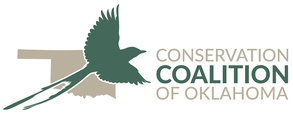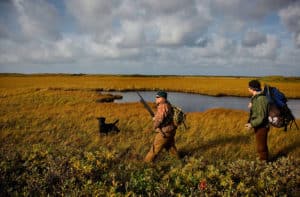SB776, SB774 and HB2214 create an odd mix with public lands vs. license feesBy KELLY BOSTIAN
For the CCOF Three important bills that involve the Oklahoma Department of Wildlife Conservation have created some confusion among constituents, thanks to similar numbering, the same sponsors and one bill standing as a combination of the other two. At the heart of the three bills are two things that hunters and anglers absolutely need, a valid license and place to go–but the bills pit the two needs against each other. The three include Senate Bill 774, which returns authority to the Wildlife Department to structure and set prices for its own licensing program; SB776, which forces a delay on any lands sales to the Wildlife Department for six months, and House Bill 2214, which combines the first two ideas. The Wildlife Department requested and supports SB774, which follows through on an in-depth economic study that recommends the Wildlife Department use a structure that reduces the large number of different tags and licenses currently offered and creates a system that can easily respond to the free market or offer discounts and promotions to increase sales. Not one of those things could be done currently without first going through a long legislative process. The bill is co-sponsored by Sen. Casey Murdock, R-Felt, and Rep. Kevin McDugle, R-Broken Arrow, it has passed through committees and is ready to go to the Senate Floor, but must get there before Thursday—the deadline for bills to go up for a floor vote in the House or Senate. The bill dies if it does not make that deadline. Only one of the three bills, SB776, also by Murdock, has passed a Senate Floor vote and already met the deadline. The measure passed 39-6, without discussion, on Wednesday and is set to go the House. The Wildlife Department officially stands neutral on SB776 (although they don’t necessarily support it), said Corey Jager, Wildlife Department legislative liaison. The bill is Murdock’s third annual attempt to restrict the Wildlife Department’s ability to create additional public lands for hunting and fishing. It would prevent sales of lands to the department without first advertising those lands at the appraised price for six months. An exception is allowed for inholdings already surrounded by Wildlife lands, or for lands gifted to the department. The rule would apply only to the Wildlife Department and no other public entities, such as Oklahoma Tourism and Recreation or any number of federal agencies. Murdock has said the bill it is a great compromise from what backers in the Oklahoma Farm Bureau and the Oklahoma Cattlemen’s Association had wanted, which included no net gain in public acreage for hunting and fishing. He holds that the amount of land available is limited and that the majority of his constituents are philosophically opposed to more government ownership of lands. The bill serves “to protect the private landowner,” he said. The Conservation Coalition of Oklahoma is raising objections to SB776 as an unfair restriction, contrary to free market ideals, that violates private landowners’ rights to sell their lands to whoever they please, whenever they please. Another objection notes that it could be unconstitutional because the ability for the department to purchase lands is laid out in Article XXVI, Section 2 of the Oklahoma Constitution. That Article creates the Department of Wildlife and the Wildlife Commission and states, “Nothing in this Act shall repeal any existing laws now on the Statute, pertaining to game and fish. The Commission may acquire by purchase, gift, grants-in-aid from the Federal Government, or otherwise, all property necessary, useful or convenient for its use in carrying out the objects and purposes of this Article.” Sen. Murdock has countered that his measure does not prevent land purchases but only regulates them. On the House side of the equation is HB2214, also sponsored by Murdock and McDugle. It combines the language of both Senate bills, a practice some label “logrolling,” the act of rolling a good idea into a bill with a bad idea in a quid pro quo arrangement. Or, as Rep. McDugle said in a committee hearing, it is a compromise bill where no one is completely happy. HB2214 also has passed committees and is ready to go to the House floor, but also will have to be heard before Thursday or it will be dead. Indeed, Wildlife Department officials have said that they are “not happy” with HB2214 but the agency has signed on to the compromise. “The licensing is important enough to us that we can accept HB2214 because we don’t feel the lands restrictions will end up hurting us all that much,” Jager said. Kelly Bostian is a conservation communications professional working with the Conservation Coalition of Oklahoma Foundation, a 501c3 non-profit dedicated to education and outreach on conservation issues facing Oklahomans. To support Kelly’s work please consider making a tax-deductible donation at https://www.oklahomaconservation.org
0 Comments
Leave a Reply. |
Archives
May 2024
Categories
All
|
Conservation Coalition of Oklahoma
P.O. Box 2751
Oklahoma City, OK 73101
[email protected]



